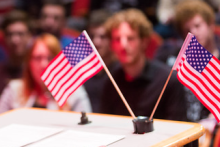After the terrorist attack on the United States last Tuesday, some Europeans mention feeling closer to the United States than ever before. Empathy has drawn many diverse people together, creating an extraordinary bond of solidarity. For Americans living abroad, however, the distance separating them from their homeland has rarely felt more formidable.
During the first horrifying hours, they tried frantically to reach loved ones who worked in or around the World Trade Center. Although in Europe we might have been busily punching keyboards in an effort to contact friends and family, computers were the last things on their minds. Phone lines to the United States and in particular to New York City were occupied or out of order, preventing that ordinarily fundamental line of communication. American airports closed by noon on Tuesday thus eliminating any hope of physically getting home. For the first time, those 3000 kilometers separating Americans from their native soil felt isolating.
Television became our lifeline. Many of us spent last week riveted to the television, trying to glean as much information as possible, as though more heinous images on CNN would help us to make sense of the terrorist attack. Finally, e-mails blurted messages of reassurance. At last, calls came from the United States relieving the limbo in which American expatriates found themselves. Several days later, travelers were able to return home. The notion of distance, however, remains altered.
Now there is a new group who feels the agony of isolation: citizens of Afghanistan. Afghan refugees in the Netherlands express desperate frustration to learn any news of their friends and relatives still in Afghanistan. Their country's current leaders cut off communication with the international community well before the recent tragedy in the United States. Afghan refugees cannot call, send e-mail messages, or even write letters. They rely on Western news sources, often in languages that they hardly understand, further emphasizing the distance between them and their homeland.
The potential Afghan victims of military action are innocent people, in much the same way that the casualties of the September 11 attack were innocent. If ordinary Afghan citizens become victims of retaliatory attacks that they are helpless to stop, then the distance between the American and Afghan victims diminishes to nihil.

For the first time, those 3000 kilometers seperating Americans from their native soil felt isolating.







